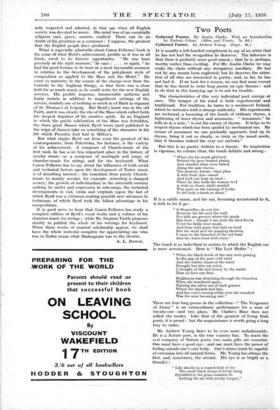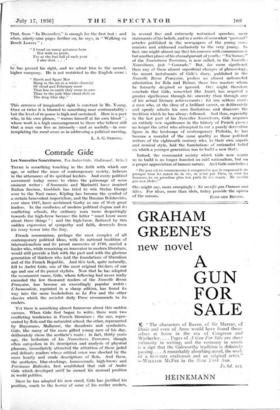Two Poets
Collected Poems. By Austin. Clarke. With an Introduction. by Padraic Colum. (Allen and Unwin. 7s. 6d.) Collected Poems. By Andrew Young. (Cape. 6s.) IT is usually a left-handed compliment to say of an artist that
he has not had the recognition he deserves. The inference is that there is probably some good reason ; that he is, perhaps, worthy rather than exciting. For Mr. Austin Clarke we may make the claim without any derogatory corollary. He has not by any means been neglected,' but he deserves the atten- tion of all who are interested in poetry, and, so. far, he has not had it. If we look for a reason, we can find none except that he has dared to write long poems on epic themes : and to do that in this hurrying age is to ask for trouble.
The characteristics of this very individual poet emerge at once. The temper of his mind is both experimental and traditional. For tradition, he turns to a mediaeval Ireland,
which he recreates with a strange authority. His experiments are technical, a loosening of the bonds of ordinary rhyme, a tightening of inner rhyme and assonance. " Assonance," he tells us in a note, " is not the enemy of rhyme. It helps us to respect rhyme which has been spoiled by mechanical use. By means of assonance we can gradually approach, lead up to rhyme, bring it out so clearly, so truly as the mood needs, that it becomes indeed the very vox caelestis."
But this is no poetry written to a theory. Its inspiration is vigorous, its colours clear, the touch definite and strong :
" When the far south glittered Behind the grey beaded plains, And cloudier ships were bitted Along the pale waves, The showery breeze—that plies A mile from Ara—stood And took our boat on sand :, There by dim wells the woman tied A wish on thorn, while rainfall Was quiet as the turning of books In the holy schools at dawn."
It is a subtle music, and the ear, becoming accustomed to it, is loth to let it go :
" 0 Storyteller, do not tire
Between the fire and the wall, For hills are greener where the spade Has been : though I ran with the bird-floen3 Until the fields were small, And from wild grass that had no herd But the wind and the gapping shoWers, I came to the branches of the red fruit And the water loud with stars."
The touch is as individual in metres to which the English ear is more accustomed. Here is " The Lost Heifer " :
" When the black herds of the rain were grazing
In the gap of the pure cold wind And the watery hazes of the'hazel Brought her into my mind, I thought of the last honey by the water That no hive can find.
Brightness was drenching. through the branches When she wandered again, Turning the silver out of dark grasses
Where the -skylark had lain,
And her voice coming softly over the meadow Was the mist becoming rain."
There are four long poems in the collection–" The Vengeance of • FiOnn " is an extraordinary performance for a man of twenty-one—and two plays. Mr. Clarke's Muse 'does not solicit 'the reader. Like that of the greatest of living Irish poets, it is proud : but the acquaintance is worth going a long .
way to make. -
Mr. Andrew Young dares to be even more iinfashionable. He is a Nature poet, in the true country line: To reach 'the real company of Nature poetS, two main gifts are essential. One must have a good eye ; and one mustbave the power 'Of feeling outside one's own body. One's senses must be capable of ektensiOn into all natural forms: Mr: YoUng has always the first, and, sometimes, the second. 'His' eye is as bright as a thrush's " Like shocks in a reaped field of rye The small black heaps of lively dung Sprinkled in the grass meadow lie Licking the nir with smoky tongue."
That, from " In December," is enough for the first test : and
when, ninety-nine pages further on, he says, in " Walking on Beech Leaves " :
• " I tread on many.autumns here. But with no pride,
For at the leaf-fall of each year I also died. . . ."
he has proved his right, and we admit him to the second, higher company. He is not restricted to the English scene : " Slioch and Sgurr Mor Harig in the air in a white chastity
• :. Of cloud and February snow That less. to earth they seem to owe Than to the pale blue cloud-drift or The deep blue sky."
This sureness of imaginative sight is constant in Mr. Young.
Once.or twice it is blurred to something near sentimentality : but the level of response is high and sustained. Here is a poet who, in his own phrase, " warms himself at his own blood " ; whose work is a high encouragement to those who believe still that a man can live as intensely—and as usefully—in con- templating the rural scene as in addressing a political meeting.
L. A. G. STRONG.















































 Previous page
Previous page